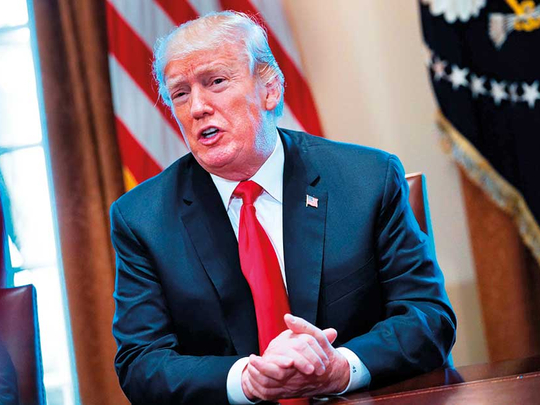
In a highly controversial move, US President Donald Trump decided to impose tariffs on steel and aluminium imports to the US. The move, likely to invite retaliatory measures from other countries, raising the spectre of a trade war, dominated the headlines this week.
The Washington Post wrote a trenchant editorial noting that Trump’s tariffs will hurt all Americans. “Prices on everything made from steel and aluminium will go up; jobs saved by producers may be offset by jobs lost elsewhere. If that seems contradictory, consider the fact that this tax increase on raw materials comes from the same president who says the economy is booming because he cut taxes on income. Trump’s words are not always an exact guide to the policies his administration formally adopts. Already, though, the president and his commerce secretary have legitimised unilateral invocation of a ‘national security’ exception to normal trade rules. Other countries can play that game, too; and more might try, now that the United States has set this bad example. Race to the bottom, trade war: Call it what you will, the spiral will eventually harm everyone, the US and its metal industries very much included.”
The Wall Street Journal editorialised that the tax increase will punish American workers. “Donald Trump made the biggest policy blunder of his Presidency by announcing that next week he’ll impose tariffs of 25% on imported steel and 10% on aluminium. This tax increase will punish American workers, invite retaliation that will harm US exports, divide his political coalition at home, anger allies abroad, and undermine his tax and regulatory reforms,” the paper concluded.
No one should underestimate the escalation of global trade tension that will result from Trump’s decision to impose steel tariffs on national security grounds, wrote the Financial Times. The paper added, “Trade wars are good and easy to win,” the president tweeted, threatening a few hours later to add further unspecified taxes on imports at the US border. Before such serious consequences become apparent at the WTO, the US president’s move is almost certain to provoke retaliation and the threat of an escalation into a full trade conflict. The US administration said that 2018 would be the year it brought trade troops to the ramparts. We hoped this was a bluff, but now know the US assault brigade are carrying heavy offensive weapons. The president is playing with fire and the casualties will be felt at home as much as abroad, paper underlined.
The New York Times called trade wars destructive. “It’s also not clear that these tariffs will help Trump achieve his goal of increasing manufacturing employment in the United States. For example, businesses located in this country already produce about 70 per cent of the steel used here. Experts say for every new job at a steel mill or aluminium smelter that is created by this trade decision, the country could lose as many or more jobs at businesses that use those metals, which will now cost more. This is one of the reasons that trade wars are, in fact, not easy to win,” the paper wrote. Trump clearly sees trade as a zero-sum game. He and some of his most protectionist advisers, including Peter Navarro, think that if China and Mexico sell the US more things than they import from America, they are winning, The New York Times cautioned, adding, “The president wants to turn the table on them with tariffs and other trade restrictions. But trade is much more complicated than that. Tariffs are blunt instruments that can hurt countries that use them, just as much as they can help. The steel and aluminium tariffs might, on their own, have only a small impact on the economy. But the greater fear many experts have is that Trump is just getting started and will impose new tariffs on a host of other imports, sending the US into a much broader trade war, the likes of which the world hasn’t seen since the Great Depression. That would have a large and devastating economic impact, in the US and around the globe.”





_resources1_16a31069e4e_small.jpg)






